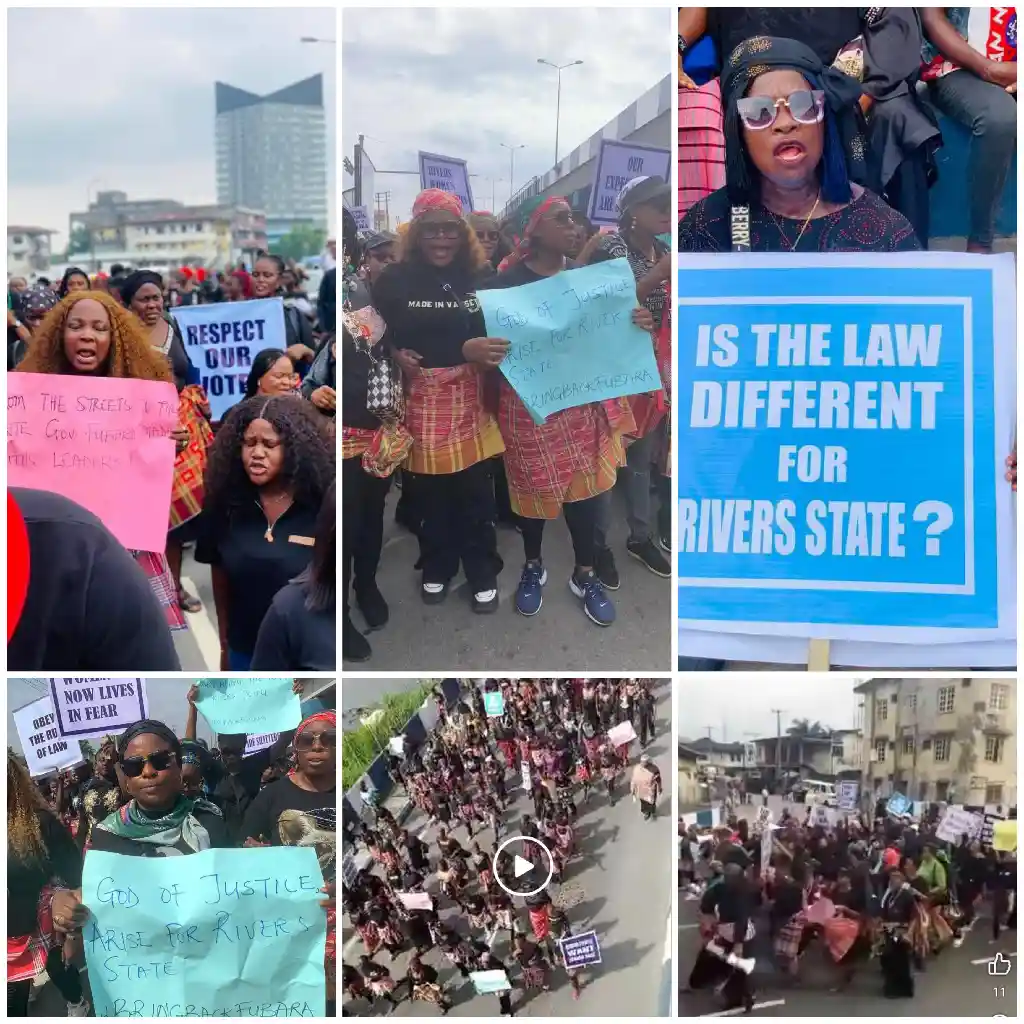Pharaoh, Let My People Go! – Thousands of Rivers Women Lead Mass Protest Against Emergency Rule
- Advertisement -
PORT HARCOURT, Nigeria – A sea of voices filled the streets of Port Harcourt on Friday, April 11, 2025, as thousands of women marched in defiance of President Bola Tinubu’s declaration of a state of emergency in Rivers State. Their message was clear and resonant: “Pharaoh, let my people go!”
The women’s protest, echoing the biblical cry for liberation, was sparked by the federal government’s suspension of Governor Siminalayi Fubara and the imposition of a military-appointed administrator.
“This Is Dictatorship!” – Women Raise Their Voices for Democracy
Organized primarily by grassroots women leaders, the demonstration drew strong symbolic parallels to the biblical Exodus. “We refuse to be silenced or ruled by decrees,” declared a protest leader, addressing the crowd of black-clad women holding placards that read “Restore Democracy Now!” and “Tinubu, Free Rivers State.”
- Advertisement -
“This is not governance. This is tyranny in disguise,” said Amina Okoro, a prominent community organizer. “Just as Pharaoh enslaved the Israelites, Tinubu has enslaved the people of Rivers through this unconstitutional decree.”
Watch Video of Rivers Women Protests Against Tinubu’s Emergency Rule
- Advertisement -
A State in Crisis: How It All Began
The unrest began on March 18, 2025, when President Tinubu invoked emergency powers under Nigeria’s constitution, citing “severe political instability” due to prolonged conflicts between factions loyal to Governor Fubara and those aligned with former Governor Nyesom Wike.
In a controversial move, Tinubu suspended Governor Fubara, Deputy Governor Ngozi Odu, and the entire state assembly. In their place, he appointed Vice Admiral Ibok Ekwe Ibas (Rtd.) as sole administrator—effectively sidelining democratic governance in Rivers State.
Legal scholars have widely criticized the suspension as “legally questionable” and lacking constitutional justification.
- Advertisement -
Supreme Court Showdown: Opposition Fights Back
The federal takeover has ignited a constitutional crisis. Eleven opposition-led states—governed by the Peoples Democratic Party (PDP) including Akwa Ibom, Bayelsa and Delta—have filed a lawsuit at the Supreme Court, challenging the legality of Tinubu’s actions.
According to legal experts, the court’s decision could have historic implications for Nigeria’s federal structure and democratic safeguards.
Prof. Chidi Anselm, a renowned constitutional lawyer, warned: “If this decree stands, any governor could be removed under ambiguous pretenses. It sets a dangerous precedent for centralized authoritarian control.”
Echoes of Resistance: Women Take the Lead
The Port Harcourt protest draws from a long tradition of Nigerian women standing at the forefront of civil resistance. From the Aba Women’s Riots of 1929 to the #EndSARS protests of 2020, Nigerian women have historically challenged oppression with courage and resolve.
“This is more than a political fight,” said Dr. Nkiruka Adeboye, a political analyst. “It’s a moral fight against the erosion of democracy. When elected officials are removed without due process, every citizen’s voice is erased.”
- Advertisement -
Women at the protest emphasized that their mission is generational. “We’re doing this for our children—for their right to live in a country where laws matter and votes count,” said one demonstrator.
What’s at Stake: Oil, Power, and the Future of Democracy
Rivers State is not just politically significant—it’s economically vital. As the producer of 30% of Nigeria’s oil output, the state is central to national revenue. Since the emergency decree, investor confidence has wavered, and disruptions in oil operations are already being reported.
Key Developments at a Glance
| Development | Details |
|---|---|
| Federal Takeover | Admiral Ibas now oversees all governance functions in Rivers State. |
| Economic Fallout | Investor confidence shaken; oil disruptions feared. |
| Legal Showdown | Seven states challenge Tinubu’s decree at the Supreme Court. |
The unfolding situation in Rivers is not just about one state—it’s about the soul of Nigerian democracy. As more protests loom and the legal battle intensifies, the question remains: Will democracy prevail, or will emergency powers rewrite the rules?
Reporting by correspondents in Port Harcourt, with additional coverage from Abuja and Lagos.
- Advertisement -



Decreeing of an unconstitutional state of emergency without in accordance with the constitution of the federal republic of Nigeria, is a demonstration of political and democratic earthquake caused by the erosion of irrationality and constitutional brainwash in the present administration.